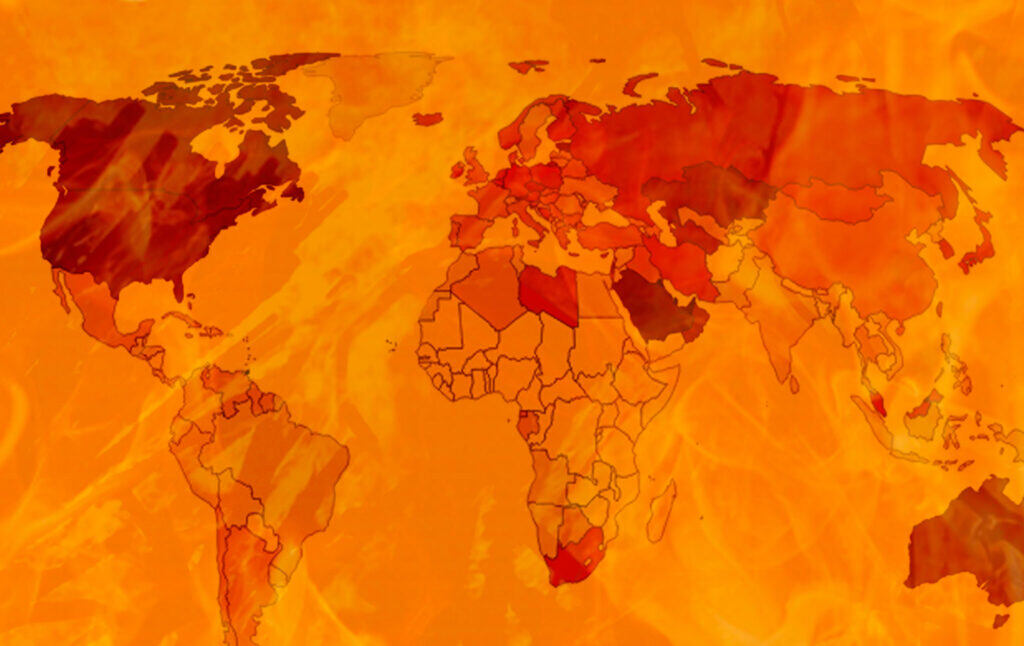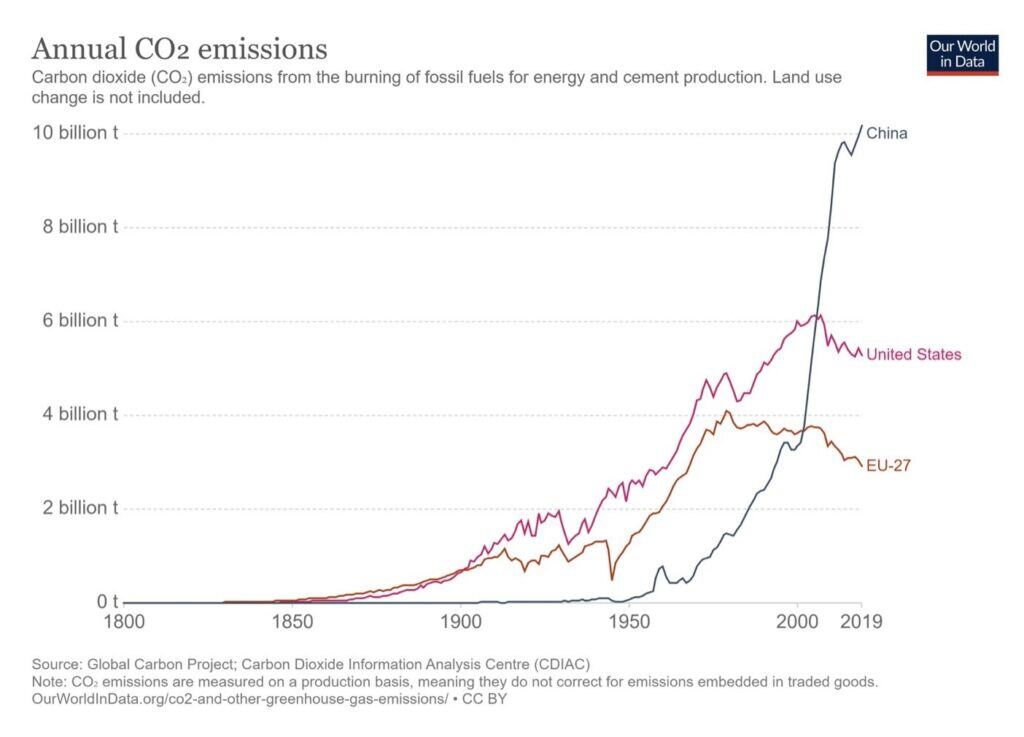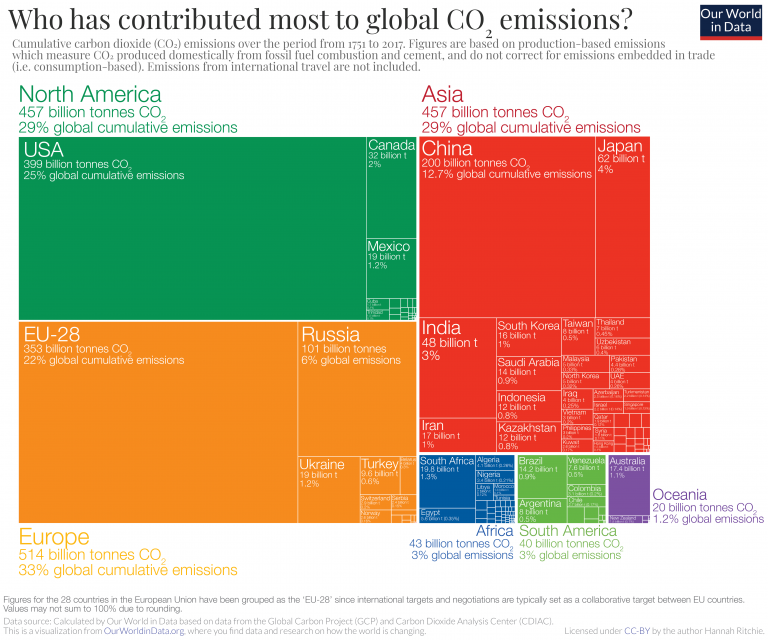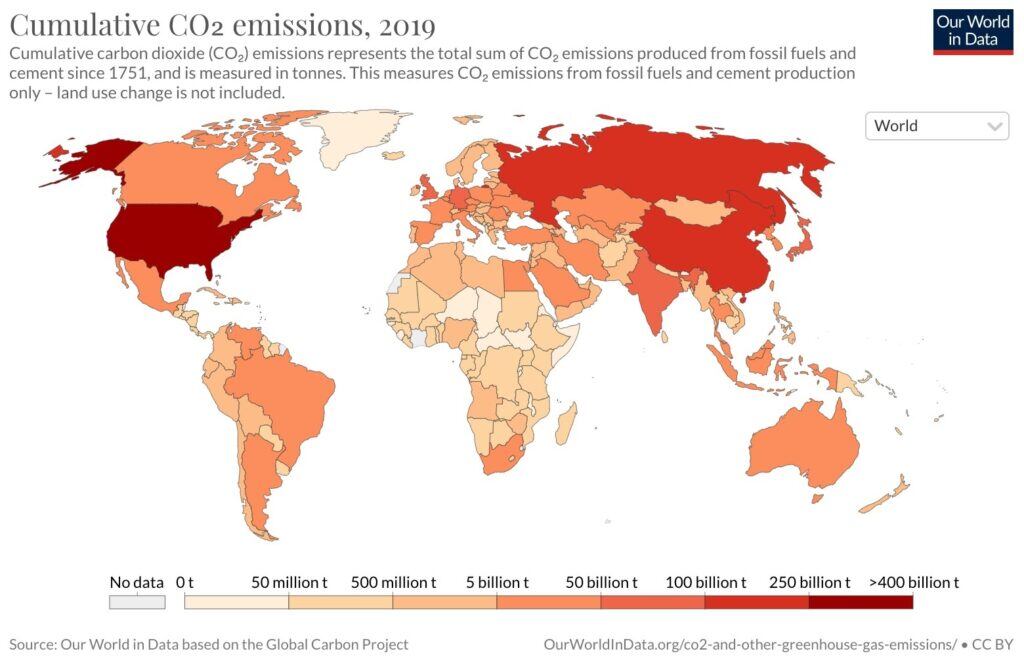
How To Think About International Responsibility For Climate Change
We need to begin with the recognition that the United States has been more responsible for the climate catastrophe than anyone else. We have inflicted costs on the rest of the world that they rightly resent us for.
You and your frenemy Billy and six other people are stranded on a remote island. Fortunately, the island is covered in mango trees. Unfortunately, Billy is a greedy bastard and on the first morning you wake up to discover that he’s eaten half the mangos on the whole damned island. The rest of you now need to conserve your mangos carefully if you are to survive. You try to hash out an agreement with Billy on the number of mangos that each person is allowed to eat. If each of you eats one mango a day, you figure you’ll be able to hold out indefinitely without exhausting the mango supply.
But every night Billy continues to eat at least two mangos. And, sick of watching Billy gorge himself on mangos while everyone else conserves, everyone else begins to take a little more mango here and there. It gets to the point where Billy is eating two mangos a day, and everyone else is eating about 1.25. Nobody is eating a sustainable quantity of mangos. We’re all going to starve soon if this keeps up.
You desperately try to work out a collective agreement to limit mango consumption that everyone will abide by. Billy, with just an unbelievable amount of nerve, argues that he is not actually responsible for the bulk of the mango problem, because the non-Billy portion of the population is responsible for 1.75 excess mangos per day while he is eating only one excess mango per day. When he says this, everyone else develops a sudden uncontrollable desire to choke Billy with a mango. It is clear he is using sophistry to distract from his own greed. But Billy doubles down: he is only a fraction of the problem, he says, and everyone else is responsible for more of it than he is. The fact that Billy eliminated half the mangos on night one is rarely mentioned.
In relating this charming tropical parable, I am of course talking about global carbon emissions, with Billy a stand-in for the United States, and everyone else a stand-in for the developing world. I believe the mango story is useful in clarifying a few things that we need to understand in order to talk productively about how to achieve large-scale global emissions reduction and the various kinds of sacrifices each country owes.
First, have a look at the following chart:

This chart shows that China’s carbon emissions have increased astronomically in recent years, overtook the United States about 15 years ago, and is now twice that of the United States. This chart is sometimes used to suggest that when we talk about reducing emissions, our big focus should be on China rather than the United States. I have even seen conservatives say that the Green New Deal is essentially irrelevant because the U.S. is only responsible for a fraction of global emissions, and it matters far more what China does than what we do. Some suggest that U.S. climate activists should be devoting far more of their focus to criticizing China. For example, economist Noah Smith displays the above chart and writes:
The Climate Left does not actually mean business. The way you know this is that absolutely none of the people calling for radical civil disobedience and pipeline destruction etc. are calling for it to be done in China. China already emits more than America and Europe combined (and no, it isn’t because we outsourced our emissions to China). Furthermore, their emissions are still increasing rapidly, thanks to the huge fleet of coal plants they’re building, even as those of America and Europe trend downward. And they have a tendency to sink any international climate deal that would require them to compromise their economic growth even a little bit. Yet as soon as you mention this to anyone on the Climate Left, and they instantly shift from talking about the imminent destruction of the planet to talking about moral issues, like per capita emissions or historical emissions — things which the climate definitely does not care about even a tiny, tiny bit. Everything, everything must be sacrificed to save our planet, unless those sacrifices have to be made by someone in the People’s Republic.
Smith’s argument is that if we are to be serious about controlling emissions, our focus needs to be squarely on China. Elsewhere, of China, he writes:
[D]espite making some bold emissions reduction pledges in recent years, China is pressing ahead with the construction of a vast fleet of new coal plants, and is financing the construction of other coal plants all over the world. It is clear that for China, economic growth — and its own military power — take absolute precedence over addressing global warming. Cost reductions in solar and batteries will eventually persuade China to switch to green energy out of pure economic self-interest, but no amount of wheedling, cajoling, flattery, or “moral leadership” by the United States is likely to change its self-interested calculus one iota.
Now, it is absolutely correct that more emissions presently come from China than the United States, and that greater emissions reductions must therefore occur in China. However: it is also important to understand why China and other developing countries may be stubbornly resistant to pressure from the U.S. in particular on this, and why we cannot have a serious conversation about how the world should go about reducing emissions without discussing the overwhelming responsibility borne by the United States.
What Smith dismisses as a “pivot to moral issues” is actually very important: in a tort case over an oil spill, for example, determining responsibility for the spill is going to be an important part of negotiating an agreement for who has to do what in order to clean it up. An oil company may want to say “Well, we may have caused the spill originally, but Party X’s subsequent failure to mitigate it is now the biggest source of the ongoing problem,” and they may dismiss discussions of their responsibility as a “pivot to moral issues,” but without that pivot, it is impossible to address the problem in a way that assigns burdens fairly among the parties. Morality is important in stopping climate change; if the costs of addressing it fall on the poor rather than the rich, for instance, then we might address climate change without achieving climate justice—because addressing climate change will have exacerbated inequality. (This is one reason the Green New Deal focuses on economic issues as well as explicitly climate-related ones.)
(Separately, it also makes sense for the United States climate left to focus on the United States, rather than China, for the simple reason that the U.S. climate left has the most political influence and responsibility for its own country. It makes sense to focus on your country. For instance, I am more interested in U.S. foreign policy than any other, because in a democracy the U.S. people are supposed to exercise control over our government, and so when it commits crimes, those crimes are done in our name. You focus on the countries’ actions that you (1) bear the most responsibility for and (2) can affect. The U.S. climate left cannot conduct effective civil disobedience in China, but what it might be able to do is pressure its own government to be part of the kind of global climate agreement that might both work and be fair, and to take the lead on achieving zero emissions.)
Let us consider a few pieces of information that Smith does not display. Here, from the same website as the original chart, are depictions of the total amount contributed to emissions by various countries:


And here are per capita emissions, showing what the average person’s carbon footprint is by country:

You can see here that even though China may have, in total, much higher emissions than the United States, the United States bears considerably greater responsibility for the present climate crisis than China does.
The chart showing annual emissions, with China overtaking the U.S., can take us toward quite a misleading conclusion, actually, if we try to use it to determine which country is exceeding its “fair share” of emissions. After all, the population of China is about 1.4 billion people; the U.S. has 328 million. We would expect a population of 1.4 billion to have much higher total emissions than a population consisting of much fewer people. In fact, the rather incredible thing here is that even though China has so many more people than the U.S., the U.S. still manages to have contributed the highest cumulative total of carbon emissions! That’s some impressively reckless use of fossil fuels.
The population difference is important, because it explains why saying “China is the biggest problem” can sound a bit like Billy saying “everyone else’s mango consumption is currently contributing more to the problem than mine.” It is technically accurate but it is not going to be possible to negotiate a fair resolution to the problem without apportioning responsibility. Let’s say we have four cities on a map, each with a population of equal size. We draw a circle (Circle I) around one city. Then we draw another circle (Circle II) around three cities. We chart the annual emissions of each circle. Lo and behold, the Circle II emissions are much higher, which leads us to conclude that addressing Circle II’s emissions is far more important than addressing Circle I’s emissions.
But it might be the case that even though there are more people in Circle II, those people are actually behaving far more responsibly than the people in Circle I. In fact, perhaps they have, on average, half the carbon footprint of Circle I people, who have been burning fossil fuels at an unbelievable rate and are actually responsible for most of the problem.
If you look at the above maps selectively, you can find ways to obscure U.S. responsibility for the climate crisis. Let’s say you drew a line around a bunch of those light-colored countries in Fig. 3, the ones with very low per-capita emissions. If you drew it around enough of them, you could produce a unit that had far higher total emissions than the United States, because it had far more people than the United States, even if each one of those people was contributing relatively little compared to the average U.S. resident. And you could make the same argument that is made about China: look, the real problem here is not the United States, it is these 3 billion people who have far higher total emissions than the U.S.! But in doing so, you would be obscuring the fact that these people are actually living comparatively sustainably and the fact that they did not cause nearly the same amount of the problem. (Note: comparatively sustainably does not mean sustainably. Chinese emissions must drop to zero just like U.S. emissions. It is only to note that the average Chinese person is causing far less of a percentage of the problem than each person in the U.S. China is producing billionaires faster than any other country and should not be let off the hook for this, although instead of blaming the “U.S.” or “China” we should really be blaming the rich as a class, wherever they are.)
Of course, as an empirical matter, we need the whole world to get to net zero emissions. This is why, in response to my pointing out the U.S. role, Smith argued that per-capita emissions do not matter. After all, he said, if it was per-capita emissions we cared about, Qatar would be the most responsible for the climate crisis, which clearly it isn’t. But it is first worth noting that if Qatar, with even higher per-person emissions than the U.S., tried to tell any other countries what they should do about climate change, they would be deeply resented, because they would be asking for something from those countries that they were unwilling to do themselves.
The United States has grown rich through burning fossil fuels. In doing so, it has essentially committed a vast act of theft from the rest of the world, by imposing costs that we do not pay for. Now, other countries are trying to catch up to the standard of living that the United States has. But of course, for a country like China, with so many more people, to have a per-person carbon footprint anywhere close to that of the United States would be an utter catastrophe. The future of the planet depends on making sure that as other countries develop, they go to great expense to make sure they do not do so by the same catastrophically destructive methods we ourselves used to get rich. (“Getting rich” is not in fact necessary to living well, despite decades of propaganda suggesting that the health of a nation is measured by its gross domestic product.)
This context needs to be taken into account every time you see a statement like “China wrecked the climate talks.” China, quite understandably, resents the idea of entering into an agreement that requires it to adhere to limits that the United States grew rich by refusing to adhere to. And when the U.S. points at new Chinese coal plants, and argues that the country is more committed to growth than sustainability, they may be technically correct, but they sound rather like Billy chastising others for exceeding their mango quota. (It’s a rather different situation when, say, complaints are heard from tiny island nations who have contributed almost nothing to the problem yet bear the brunt of the consequences of U.S., European, and Chinese emissions.) Or, as one person on Twitter put it, rather more revoltingly, the U.S. sounds as if it is saying “We acknowledge we’ve been grossly unfair in consuming all of the pizza but now is not the time to complain about how we’ve clogged the toilet with our excrement, you too must help us by sticking your hands in the bowl to assist us in unclogging it.” (Although that would be an improvement on the actual situation, which is that the U.S. has not acknowledged that the burdens now falling on other countries are grossly unfair.)
In fact, China is doing a fair amount to try to address climate change. It has vowed to achieve net-zero emissions by 2060 and recently started the world’s largest carbon market, with the intended effect of “forcing thousands of Chinese companies to cut their pollution or face deep economic hits.” Just a few days ago, “European Union and China presented sweeping plans to limit greenhouse-gas emissions that will increase costs for industry and consumers.” It is certainly true that these efforts do not go nearly far enough, that much is symbolic and an attempt to avoid real costly change, and that the Chinese government remains far too committed to economic growth even when that growth is emissions-heavy. But it is important to remember that when criticisms come from the United States—a country whose people have far, far worse carbon footprints, and who would have completely wrecked the planet years ago if we had a population anything like China’s—we sound like the kid who ate all the mangos and now wants to set a mango cap for everyone else.
Smith believes that the fairness question is somewhat irrelevant: what matters is that we need to get to net-zero, and Chinese emissions are by far the largest worldwide. But fairness is going to be important in any scheme that requires international cooperation. Countries will resist demands for sacrifice and expenses that are not being shared by those (the US) who have caused more of the problem. That might not be “rational,” in the economist’s sense, because it may be that from a rational perspective, a country should swallow unfairness for the sake of saving the planet. But one thing we know from experimental evidence is that people are often willing to punish actors who are perceived as behaving unfairly, even at a cost to themselves. We should not underestimate the effect that U.S. arrogance, and a refusal to take responsibility for what amount to serious crimes, will have on other countries’ willingness to enter into binding agreements with us.
Because the United States bears disproportionate responsibility for the climate crisis, it has a duty to model the behavior it wants other countries to conform to. Smith says that “economic self-interest” is such a priority for China that U.S. “moral leadership” will never work. I would respond that another reason U.S. moral leadership will never work is that the U.S. has no moral credibility to begin with. If we were a genuinely self-sacrificing nation, who were ourselves not ruled by considerations of growth over all else, we could see whether “moral leadership” worked in world affairs. As it happens, though, we are a country that has inflicted severe costs on others and is now getting frustrated that they do not like our “fossil fuels for me, but not for thee” attitude. Once we admit our outsized role in the climate crisis, we can have a sensible discussion over which countries owe the world what.


